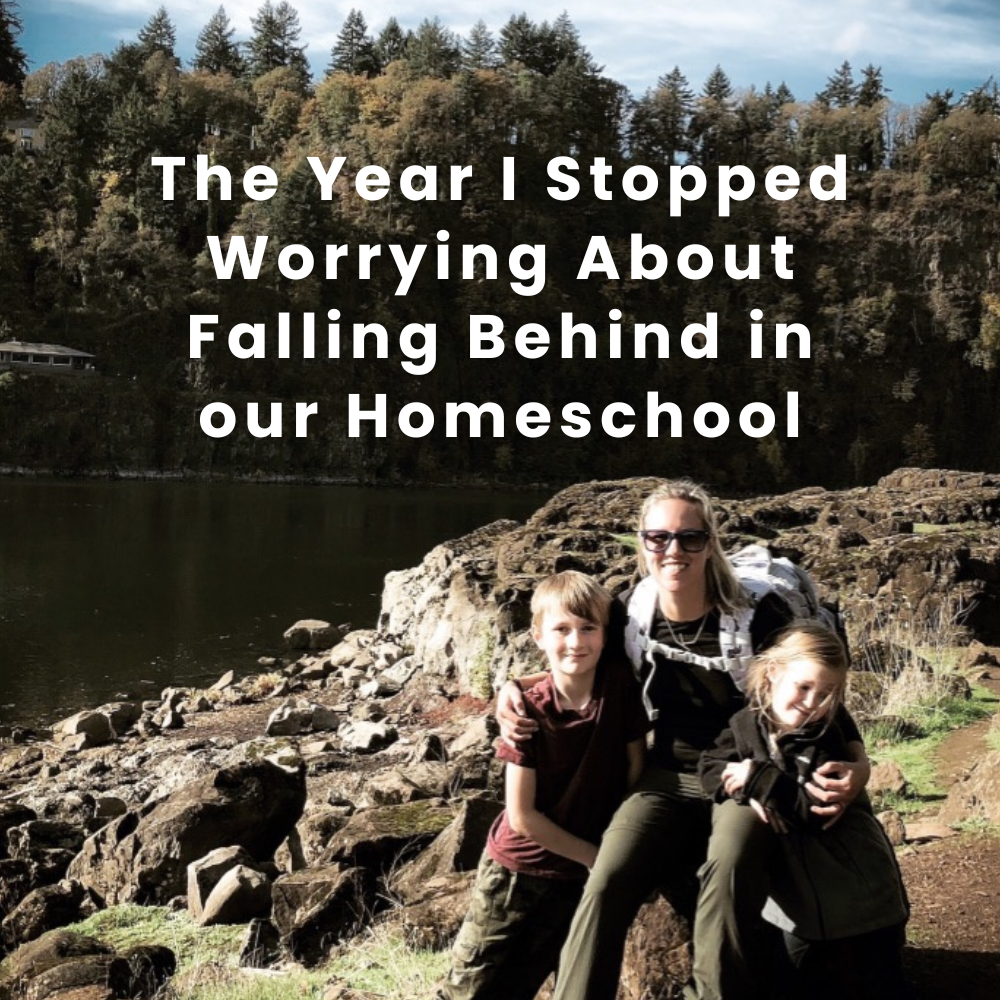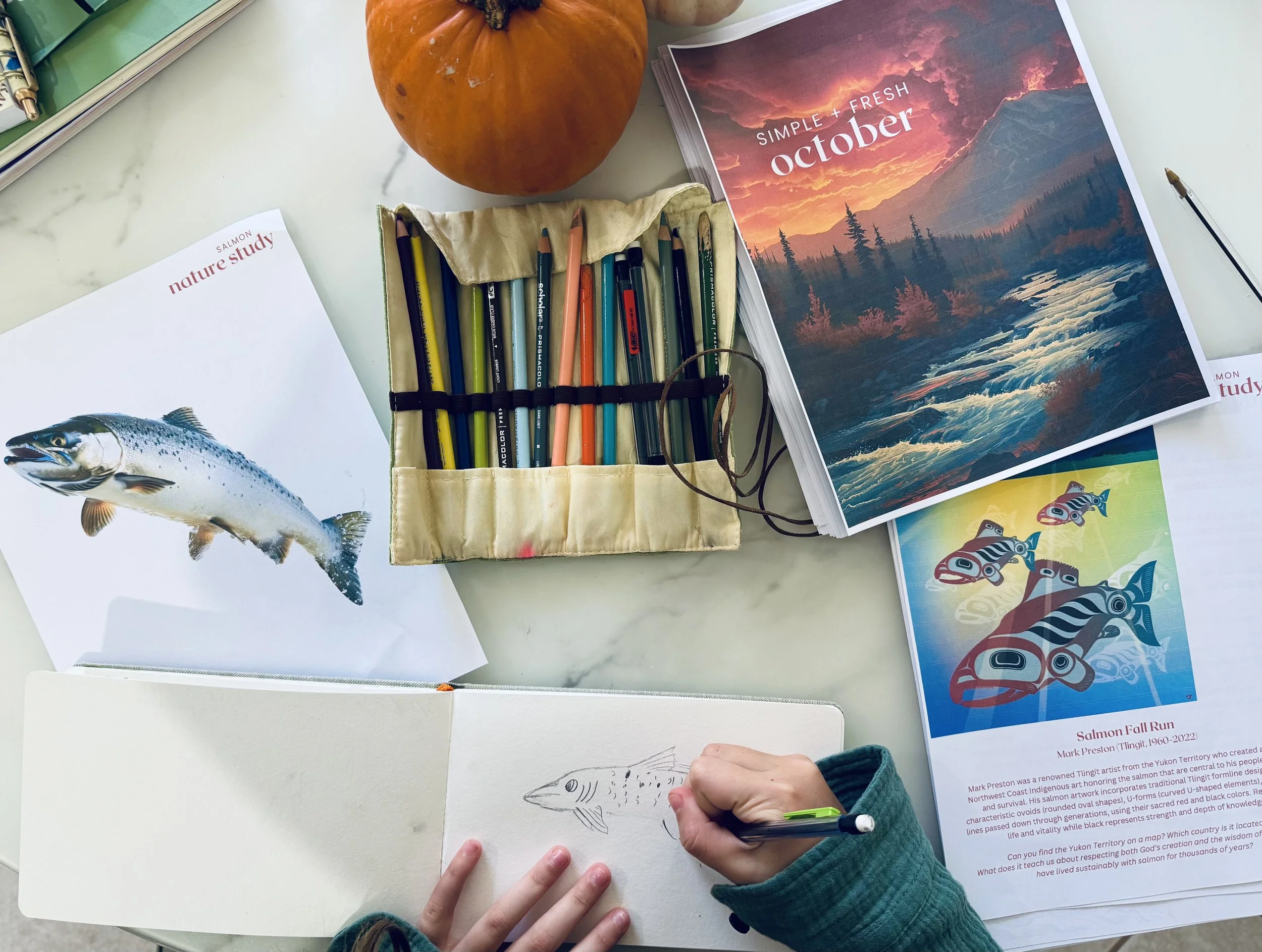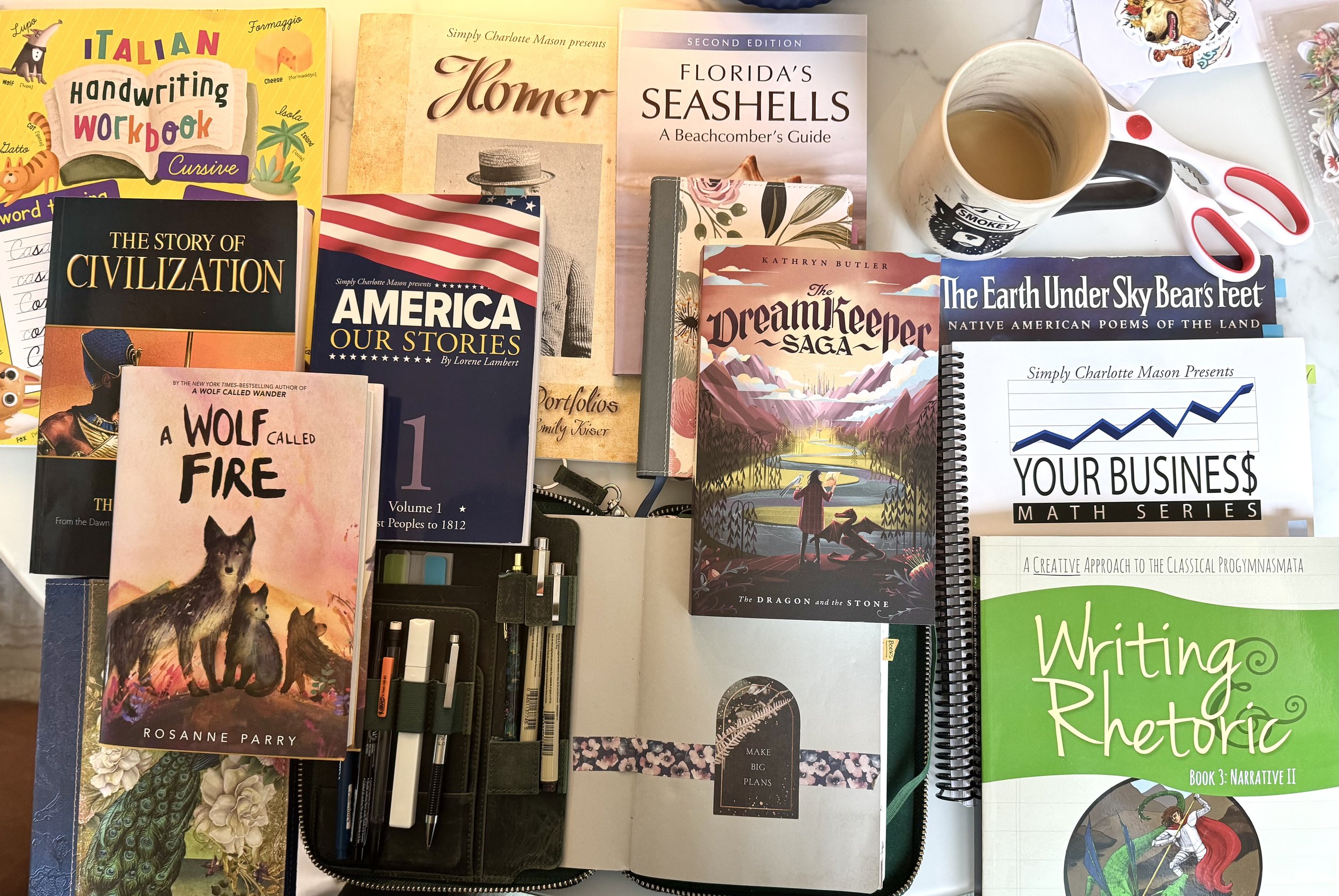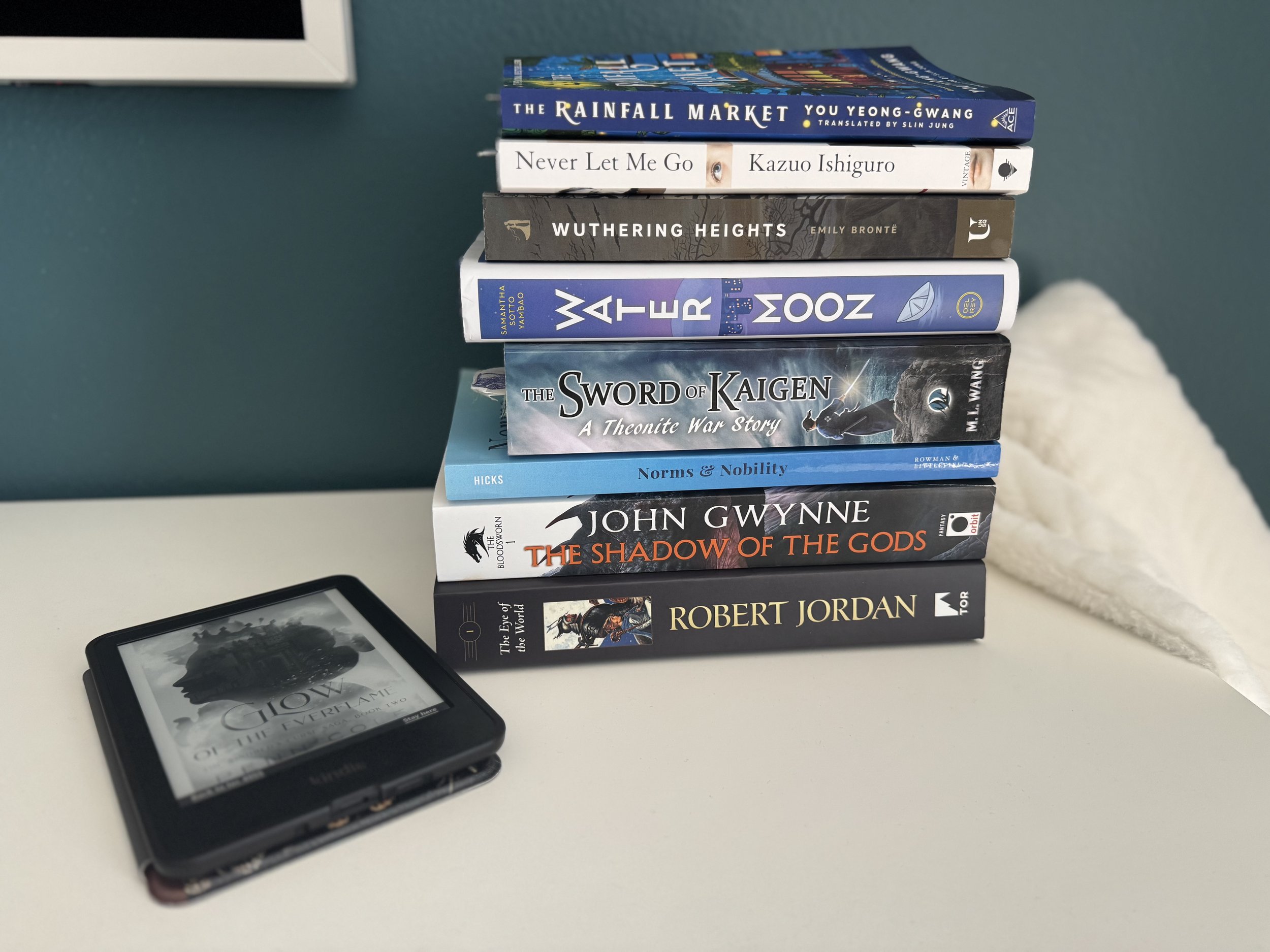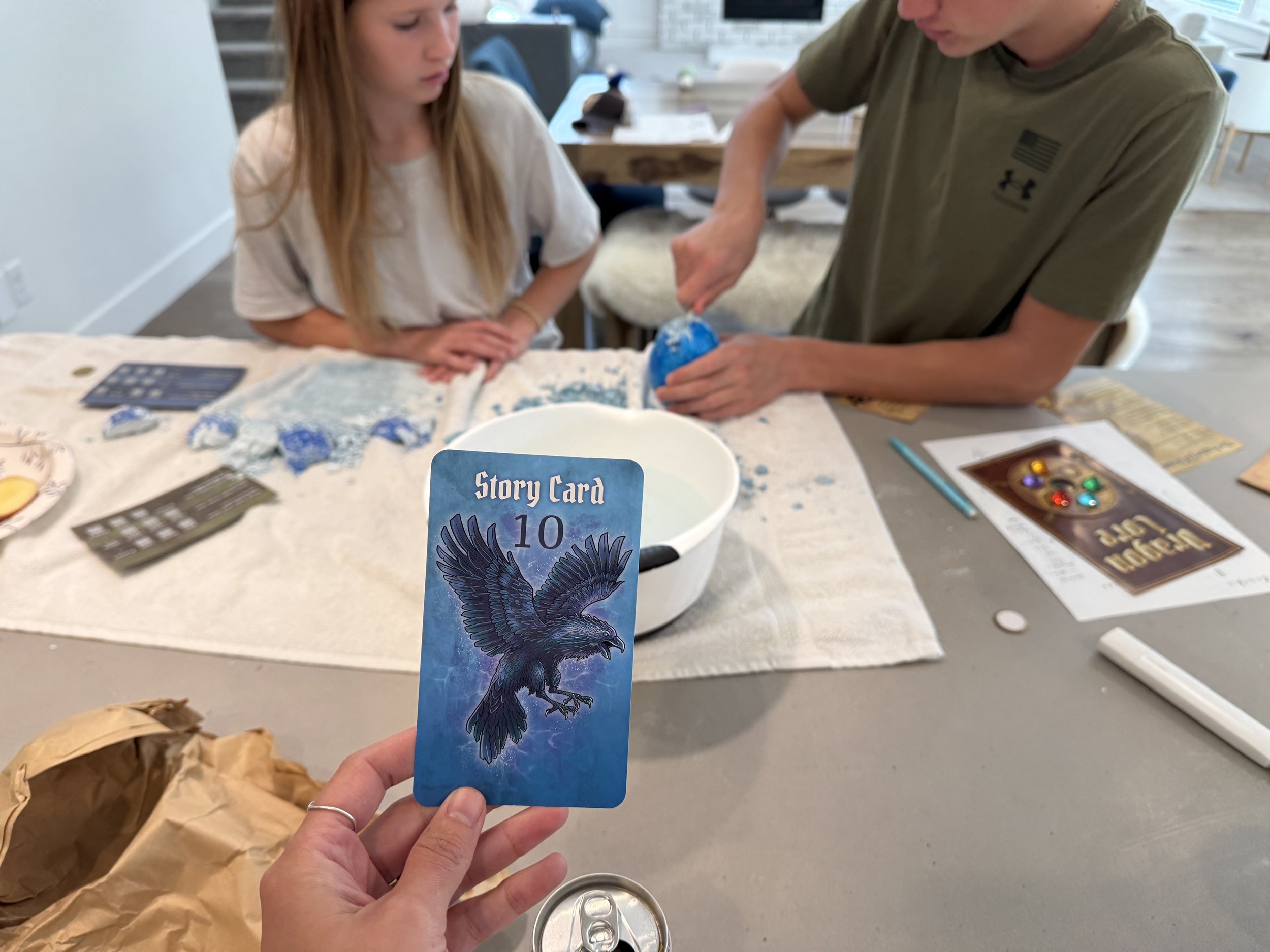I complained about dishes. She wished she had years. A homeschool mama's story about conviction, calling, and not wishing away what you can't get back. #HomeschoolCommunity #HomeschoolMom #ConvictionMatters
Read MoreThe Year I Stopped Worrying About Falling Behind
I was doing everything "right." My curriculum was carefully chosen. My lesson plans were organized. We had our books and and our scheduled study time. And yet, there was this constant, gnawing worry in the back of my mind: was this what I actually wanted their childhood to look like?
I'd look at other homeschoolers' Instagram feeds and see kids completing entire units while mine were asking to go outside again. I'd check the recommended pages in our curriculum guides and feel that familiar guilt—we weren't hitting the benchmarks the way we "should." The pressure was real, and it was exhausting.
Then it hit me…
I can't pinpoint exactly when it happened, but I remember standing in my kitchen one afternoon, looking at the stack of books on the table and then at my kids through the window, running, playing, climbing, observing wildlife...
I’d take them on weekly hikes and they JUMPED at the chance to head out on the trails.
And I thought: what in the WORLD am I doing?
My kids weren't sitting in traditional school. They weren't being forced to stay at desks. So why would I consider recreating that same pressure at home?
That's when I made the decision to lean into the outdoors and stop worrying.
God would handle the rest.
I stopped treating outdoor time like a reward for finishing lessons.
I made it the priority.
I stopped counting the hours spent outside as "lost" study time and started seeing it as the actual education.
It felt risky at first. There's something about letting go of the visible, checkable boxes that our culture says equals learning. No workbook pages completed, no standardized benchmarks met—just my kids exploring, discovering, asking questions, moving their bodies, building skills they couldn't get from a textbook.
I didn’t put down the books I was reading aloud for our lessons – I simply brought them with us or read them after a long day of being outdoors.
And then I realized – they weren't falling behind. They were learning differently, sure, but they were learning. And more importantly, they were becoming the kind of people we society needs our children to be…
When my oldest was ready to move into more formal academics, the foundation was there. The curiosity was there. The ability to focus and observe and wonder—that was all there.
Then my youngest moved into more formal lessons and the same thing happened.
And it hadn't come from a lesson plan. It had come from hours of freedom, outdoor exploration, and the space to just be kids.
The younger years matter, but not in the way I thought they did.
They're not about racing through material. They're about building a relationship with learning itself. With the natural world. With their own capacity to discover and think and move through the world with confidence.
I stopped worrying about falling behind the year I realized that "behind" was a meaningless measure for what we were actually doing.
Now, when homeschool moms tell me they feel guilty about not doing formal lessons, or worried their kids are missing something, I tell them what I wish someone had told me: those hours outside matter more than you think. The climbing, the exploring, the noticing, the wondering—that's not time away from education.
That is the education, especially when they're young.
If you're feeling that pressure too, if you're questioning whether you should be doing more structured academics, here's my encouragement: trust your instincts. Those are usually right. And if you need permission and a framework to actually do what you know matters, the 1000 Hours Outside Mega Bundle exists for exactly that reason. Over 450 outdoor learning activities and 85 complete units designed to help you build a homeschool that prioritizes time outside—without guilt, without worry, and without missing a thing.
Your kids won't fall behind. They'll just get to be kids for a little longer. And that pays off in ways you won't see until years later. 💚
✨ Why Your Passion Matters More Than Your Curriculum
I've been thinking a lot lately about what makes certain lessons stick with our children while others seem to slide right off. Why do some subjects come alive in our homeschool while others feel like we're just trudging through?
The answer, I've realized after a decade of homeschooling, isn't always about the curriculum we choose or even the child's natural interests…
Often, it comes down to something much simpler: our own passion and investment in what we're teaching.
Now, before you feel the pressure to be enthusiastic about every single subject (because let's be real, not all of us wake up excited about teaching long division), hear me out.
Not everything you teach needs to be your personal passion.
But how much you're invested and interested in each lesson really does matter to you and your child for several important reasons…
The Ripple Effect of Your Enthusiasm:
The more passionate and invested you are, the more they will be too.
This first point came to me as I taught in our homeschool community in Idaho. I’d have 20+ children in the room (or outside) while we nature journaled or learned about wilderness survival skills, logic and even geography.
When I lit up about a topic, my students leaned in too.
Our children have incredible discernment. They can tell when you're going through the motions versus when you genuinely care about what you're teaching. Your excitement becomes their excitement. When you’re passionately talking about the artists you're studying or get animated discussing different times in history and how they connect to their story today, they notice.
You're more likely to stay accountable
Let's be honest: when the week gets busy, it's the subjects we care least about that get pushed aside. For us, that’s Latin (or any foreign language for that matter), and music.
But when you're invested in what you're teaching (whatever subject area that might be), you protect that time and make it a priority. You don't let it slide when things get hectic because you actually want to teach it. That accountability to ourselves translates into consistency for our children.
More opportunity to dive deeper
When you're passionate about a subject, you naturally invest more time in preparation. You find the best living books, the most engaging activities, and you're more likely to notice connections to other subjects or current events. You don't just teach the lesson, you enrich it, expand it, and make it come alive.
Even if you’re the only one getting super excited, I promise, down the road, your children will remember bits and pieces of YOUR excitement in teaching certain lessons. In fact, my kids still tell me how excited I was going through American history and our Burgess Birds guides…
You model lifelong learning
When your children see you passionate about learning alongside them, you're demonstrating that education doesn't end (ever)! You're showing them what it looks like to remain curious and engaged throughout life. In my opinion, this might be one of the most valuable lessons we’ll ever teach them.
Your passion translates to better retention
Students remember lessons taught with enthusiasm far more than those delivered with indifference.
The emotional connection you bring creates stronger memory anchors for your children. Years from now, they'll remember not just the facts but the feeling of learning them with you.
Remember that saying? "People will forget what you said, but they'll never forget how you made them feel."
You're less likely to skip or rush through lessons
We've all been there. Friday afternoon, the week has been long, and we're tempted to just mark something off the list without really doing it justice.
But when you're invested in what you're teaching, you don't want to rush through it. You want to savor it, discuss it, and make sure your children really experience it.
A Matter of Calling and Conviction
Here's what I think is at the heart of it all:
You're fulfilling your calling through your identity in Christ with integrity.
Charlotte Mason laid out a rich feast for our children, and teaching with passion is how we honor that vision. It's not just about checking boxes; it's about genuinely believing these subjects matter and are worthy of our time and attention. When we homeschool out of calling and conviction—and we do, don't we?—we owe it to our children to follow through with the tools God gives us.
We’re not perfect homeschool. We never claim to be. But we definitely can pass on some passionate, exciting ideas onto our children.
This is a form of active obedience on our part as we take homeschooling our children seriously.
We're not just educating young minds; we're feeding souls for eternity.
We're stewarding the precious gift of time with our children and the privilege of shaping their worldview.
This is exactly why I created Simple Studies back in 2019.
I kept seeing these beautiful, rich subjects like nature study, geography, picture study, composer study, poetry, hymn study, folk songs, and fairy tales, get pushed aside when life got busy.
These weren't "extra" subjects to me. They were ESSENTIAL parts of the feast Charlotte Mason described, the very things that make education come alive and nourish the soul and help form our children’s character for LIFE.
But I also understood why they are sometimes left behind. Time is precious (and short). Planning can feel overwhelming (like we’re not living up to the plans we lay out before us). It often easier to focus on math and reading and let everything else slide.
I created Simple Studies because I am passionate about teaching these topics that often get left behind but should be the crux of our homeschool and can often help invest in our children to be set apart in the world.
These subjects aren't optional luxuries. They're vital parts of a complete education that feeds the whole person.
When we teach through passion, we're saying to our children:
This matters.
You matter.
This education we're giving you is a gift worth giving with our whole hearts.
And that, dear mama, makes all the difference.
Ready to bring more passion into your homeschool with subjects that truly matter? Check out Simple Studies and discover how easy it can be to include things like nature study, history, geography, fairy tales and more—even in your busiest seasons. Because these subjects deserve more than our leftovers; they deserve our passion and our children deserve more than just math and reading lessons.
💛 Homeschool monotony? Here's what NOT to do (do this instead)
Here's what no one mentions when they talk about homeschooling:
Most days aren't Instagram-worthy. There are no standing ovations for opening the same math book for the 47th time this year.
We show up.
We read the next chapter.
We work through the lesson. Again.
While everyone else seems to be out there changing the world with their big ideas and bold moves, we're just... here quietly doing the work.
But here's the thing…
This steady, unglamorous, faithful work is changing everything. In you and in them.
I've learned this the hard way with my own kids. One of mine completely unravels when I switch things up. Consistency is his oxygen.
My other one? Give her the same math program for six weeks straight and she's climbing the walls.
So I had to find a middle ground.
Instead of constantly overhauling our entire approach (exhausting for everyone), I started building in pause days—moments where we don't abandon our plans, but we do set them aside for 24 hours to explore something completely different. Something fascinating. Something they'd never encounter in their regular rotation.
These aren't "throw everything out and start over" days.
They're strategic breaths of fresh air.
Because I've noticed something as my kids get older: when we bail on something halfway through too many times, they stop trusting the process. They start wondering if anything is worth finishing. And that's a pattern I don't want to build.
Of course, we still drop things that truly aren't working.
But if thousands of families have walked a curriculum to the end and found it worthwhile? We push through the middle-muddle.
So if you're feeling the mid-fall monotonous slump right now...
If you're wondering whether you should scrap your plans and start fresh...
DON’T.
Just pause. Inject one day of wonder. Then pick back up where you left off.
Grab your free October guide here* and give yourself (and your kids) that little jump of joy. Hundreds of homeschool families are already using it this month.
You don't need to burn it all down.
You just need a spark.
Let us help you find it. 💛
My daughter and I recently started volunteering at a local cage-free, no-kill dog shelter. She's obsessed with dogs, and this is exactly why we homeschool—so our kids can chase their passions now, not someday when they're "done" with school.
These volunteer mornings? They're our pause days in action. The kind of learning that doesn't fit in a textbook but changes everything.
Want more ideas like this delivered monthly? New members get their first month FREE. You'll get 3 ready-to-go deep-dive topics that help you create these moments without the overwhelm. Start your free month here.
Thank you for being here!
*(Your free month begins atomically at checkout).
Term 3 Homeschool Books & Curriculum Updates: Grade 5
Hello friends!
I plan to make a video on what we’re using for our Form 3/2A (Grade 5) daughter this term but I often wait until we’ve been successfully using our new books and curriculum for a few weeks. So thanks for bearing with me…
*Our oldest child, turning 15 soon, is currently enjoying a local sports school academy but we may eventually bring him back into the homeschooling fold in his upper high school years… we’ll see what God has planned!
While moving to Florida has opened us up to many new incredible outdoor opportunities, and we’re enjoying most of what we’re diving into this last term of the year, not everything is as peachy as it looks. Math continues to be a struggle, so we switched things up (see below) and we employ a sweet lady tutor from Grade Potential who comes once/week to help so my daughter and I can enjoy our relationship more in the areas I’m more comfortable teaching (reading, writing, science — basically anything BUT math).
Our daughter is also attending multiple, in-person marine biology & micro-science lab classes in our local area that appeals to her interests around science and animals, including special homeschool gatherings at our local aquariums and nature preserves.
Finally, she is enjoying a little homeschool community here where she’s learning Italian and life skills. (Hence the Italian copywork book we decided to get last-minute which she adores using)!
Here’s our weekly loop subjects and books:
We’re reading through a simple and sweet girls devotional each week.
Our daily read-aloud is The Dragon and the Stone in The Dreamkeepers Saga - not sure what we’ll choose next!
Artist study: Homer by Simply Charlotte Mason - this is our second time studying this artist who spent time in our area and has several paintings in Florida we can see in person.
Folk Songs: Ambleside Online YouTube Folk Song lists
Poetry: The Book of Animal Poetry and The Earth Under Sky Bear’s Feet
Geography: Simple map drills using blank maps
Math: We paused Saxon - it was a lot of daily strife for us both so we’re praying about our other options. A tutor comes to our home 1x/week. Business Math by SCM - this is one thing we’ve changed up this month. A friend of hers is also completing this guide so they get to discuss it in person, which we used for our oldest as well.
History:
America: Continuing reading through America: Our Stories
Ancient: The Story of Civilization, D’Aulaires’ Book of Greek Myths - a few gods each week
World: The Age of Chivalry (audio version), King Arthur and His Knights (can be listened to in a day - read by Jim Weiss)
Handwriting/Copywork/Narration:
Narration after each read aloud - draw a picture and write a few sentences (or tell back orally)
Italian Handwriting (because she’s passionate about it!)
Writing and Rhetoric Book 3 (and looping in Easy Grammar)
Keyboarding daily - we no longer use lessons but she types frequently and we work on hand placement and posture, along with increasing type speed.
Citizenship:
Plutarch: We put this aside for spring and will pick it back up in fall.
Current Events: WORLDWatch (use code CRYSTAL3 to get your first 3 months free).
Shakespeare: Archangel Audiobooks
Handcrafts: Life skills in person at co-op
Foreign Language: Italian in-person immersion classes at co-op
Science: We put down the science books for Term 3 after finishing Beetle Busters lessons from Alveary in lieu of her attending in-person marine biology/oceanography and nature preserve gatherings.
Literature: Independent reading and audiobooks. She enjoyed A Wolf Called Wander so she’s now onto A Wolf Called Fire, along with several other independent chapter books of her choosing from the book store.
Audiobooks: Recently: The Giver, The Mysterious Benedicts Society Book 4, A House with a Clock in its Walls, The Chocolate Touch, Fantastic Beasts and Where to Find Them… and more depending on what she’s currently interested in.
I hope this is helpful for those of you with students her age. Let me know if you have any questions!
💌 February Book Picks + Fresh February Members Guide
Hello friends – I have a few exciting things lined up for you in February!
First, our new February Membership Simple + Fresh Guide will be available and ready to download Feb 1. We’re exploring the History of Chocolate, Quilting Stories and the Science of Shadows.
Don’t forget to download January too!
This month’s “Word of the Month” Book Challenge is “SHADOW.” (I listed books I’m reading and read in January below).
What I read in January:
A Beautiful Ugly ⭐️⭐️⭐️
Jaws: The Story of a Hidden Epidemic (HIGHLY RECOMMEND!) ⭐️⭐️⭐️⭐️⭐️
Connie: A Memoir ⭐️⭐️⭐️⭐️
What You Are Looking for Is In the Library ⭐️⭐️⭐️⭐️
Melania ⭐️⭐️⭐️⭐️
Clean ⭐️⭐️⭐️
Close Your Eyes ⭐️⭐️⭐️
A Deadly Game (A book that won a ton of awards by a local Floridian author) ⭐️⭐️⭐️
February Books:
So far, The Sword of Kaigen is proving to be a favorite 2025 book! ⭐️⭐️⭐️⭐️⭐️
And you can NEVER go wrong reading Norms & Nobility: A Treatise on Education.
I’d love to hear what YOU’RE reading in February!
🌴📚Mid-Year Curriculum + Life Updates 🌴
Hello homeschool friends! Sharing some HUGE Life updates and what we’re doing in our homeschool this winter. 📚 Please remember, these resources fit our children best as we are a Charlotte Mason / Passion & Interest-Led Homeschoolers (with some Classical mixed in). Thank you for watching and I hope this helps inspire you in your homeschool journey! 👏🏻💕
Read More🎁 Simple + Screen-Free Advent and Gift Ideas
As our family embarks on an exciting new chapter (I can’t wait to share more soon!), I wanted to share some of our favorite Advent and Christmas gift ideas.
We love creating a simple, screen-free holiday atmosphere (with the exception of classic movies like Christmas Vacation and Home Alone), so you won’t find tech gadgets or gizmos on this list.
Advent Ideas for your homeschool:
Hallelujah: Cultivating Advent Traditions with Handel's Messiah by Cindy Rollins - One of my all-time favorite guides.
All Creation Waits by Gayle Boss - We did this one when the kids were younger and it’s one of the sweetest books. We enjoyed Jennifer Pepito’s printable guide for this book.
My personal adult Advent daily reading I enjoy the most each year - super simple daily bits to read and reflect on: Joy to the World: Daily Readings for Advent by Charles H. Spurgeon
We plan to use Let Heaven and Nature Sing: Advent Art and Poetry Lesson Plans for All Ages from the Circe Institute this year with the family if we can get to it.
And just for fun because our family loves Escape rooms, puzzles and solving riddles together: EXIT: Advent Calendar - The Hunt for The Golden Book
Crack the crate
Crack the Crate - Both my kids (14 & 10) worked together to crack this case - and it’s really well done. Digging dragon eggs and solving crypto clues and it was the perfect difficulty level - not to difficult and not to easy!
Screen-Free Gift Ideas:
Fahlo - Our kids LOVE animals, so we track about 10 animals with these unique bracelets that to help saving endangered species around the globe! Get 20% OFF Using code SIMPLE20
Little Christmas Carol - If you enjoyed Little Pilgrim’s Progress, you might love this book too!
Book Lovers Gift Set (Okay, this one might be more for me!) haha
The Harry Potter Mystery Box – If your kids love receiving mail or subscription boxes, this would be the perfect gift that keeps on giving! Each box is filled with exclusive items from the Potterverse including memorabilia, artwork, accessories and more… cancel anytime!
More than a Puzzle! Our family adores putting these puzzles together and then taking it a step further and solving the clues to find the answer to each mystery! Some do say 14+ but our 10yo helped us solve multiple clues! Here are our favorites so far:
Jungle Escape Puzzle
The Art Studio Escape Puzzle
Midnight Garden Escape Puzzle
Zero Waste Gifts by Me Mother Earth – for the eco-conscious friends and family in your life
The Mythmakers: The Remarkable Fellowship of C.S. Lewis & J.R.R. Tolkien (A Graphic Novel) - I’m snagging this for both kids!
Coffee Produced in Bird-Friendly Habitats (Another gift I’m asking for!)
FREEBIE!
Before you go, don’t forget to download my FREE 5-Day Gratitude Journal for you and your family! way you tell your story online can make all the difference.
As we prepare for the holiday season, I hope these Advent and Christmas gift ideas inspire you to create meaningful, tech-free traditions with your loved ones. Whether you're savoring quiet moments, enjoying classic holiday films, or diving into festive activities, may this season be filled with joy, connection, and cherished memories.
Autumn Book Lineup, Geocaching Fun, Fall FREEBIE + More!
We’ve just kicked off Term 2 (Term 1 flew by!), and today I’m excited to share our new fall read-alouds, literature picks, biographies, our new Fall Tree Freebie some Geocaching fun and more!
Read More☕️ Homeschool Lessons Before Your Coffee Gets Cold [Tutors, Gifts + More..]
Helping our kids grow in their independent homeschool lessons.
Read MoreTeaching Citizenship with Purpose to All Ages
I received this email recently from a homeschooler: ”Hello!!! I would LOVE and even pay for a beginners guide to teaching citizenship and Plutarch. It feels so overwhelming to me for some reason I don’t even know where to begin, and I saw you mention in one of your videos it’s one of your favorite subjects to teach.” Warm wishes! - KM
I DO love teaching citizenship! But sometimes it sounds intimidating and I can understand why. Public school approaches these topics through subjects like “social studies” and “civics” and when homeschoolers talk about things like Rome and Plutarch and your child is 5 years old… it can feel confusing and overwhelming.
My initial response is to suggest checking out Heroes & Hope and Exploring Political Ideologies for older students, but these are launching pads to dive even deeper and appreciate this subject area.
That’s why today, I’m diving into how we can teach citizenship with purpose to all ages.
Reading through our Heroes & Hope book with my kids in April 2020!
Charlotte Mason viewed citizenship as an essential part of education, helping individuals understand their role and responsibility within society. Her approach was rooted in character formation, moral integrity, and a deep understanding of history, government, and social order.
We also don’t structure our homeschool like a traditional school, with social studies workbooks and tests.
Still, I firmly believe that citizenship encompasses the whole person—their values, beliefs, internal moral compass, and leadership development.
One key aspect I should mention is that I approach citizenship differently with my son and daughter, based on their God-given strengths, skills, and interests. In other words, our son is wired differently than his little sister. Nevertheless, they both deserve exposure to Plutarch, for example. While they may not both be naturally inclined to pursue studies in battle leadership, they are both inclined toward character development and ethics.
Here’s a brief overview of how we’ve approached teaching citizenship over the past 10 years:
Starting in Form 2B (Grade 4): We begin by gradually reading Stories from the History of Rome by Ms. Beesly. The children give an oral or a drawing narration.
Moving to Citizenship Primers: After completing Stories from the History of Rome, we introduce a citizenship primer like The Young Citizen Reader by Paul Reinsch. Alongside this, we start reading through a Plutarch Primer to familiarize the children with the lives and teachings of Plutarch, the Greek historian and biographer. Plutarch's Lives (or Parallel Lives)—biographies of notable Greeks and Romans—are considered foundational in classical education, including in Charlotte Mason's method.
Incorporating Other Stories, Current Events and Guides: While working through the primers, we also explore other historical stories and biographies, using resources like Heroes & Hope, Courage and Exploring Political Ideologies to discuss the ideas and values tied to citizenship. We enjoy poetry like Lyra Heroica, and books like Ourselves and the Socratic Dialogues. There are a plethora of great books depending on what you think your child might enjoy reading and discussing! I offer more ideas in my form guides which you can find here and here.
We also incorporate daily Current Events (as Charlotte Mason recommends). We’ve been using WORLDWATCH for a couple years and the kids BEG to watch it daily.
Click Here and use code “CRYSTAL4” for FOUR FREE MONTHS of WORLDWatch for your family.** The deal starts with a free 7 day trial, after this you will be charged $0 for the next 4 months.Diving Deeper into Plutarch: As we progress, we read Plutarch’s Lives together and discuss the various lives. Initially, my son and I read together, using guides from communities like The CMEC, The Alveary, and Ambleside Online. However, as our schedule became busier and I was reading aloud for most of the day, my son transitioned to online Plutarch classes with a community of students. For the past two years, his favorite has been classes with Thomas Banks from House of Humane Letters.
Engaging in In-Person Discussions on GREAT books: Finally, our kids participate in in-person groups where they get to discuss good books and citizenship values with their peers, focusing on the good, the true, and the beautiful. These can include things like sci-fi or fantasy fiction novels, historical fiction and more.
The key is to not box yourself in! Sure, we can enjoy a path with what others have studied for history AND we can include exciting books and dialogue with others based on modern society and the world we live in and the ideas and challenges we battle today.
In the end, as homeschool parents, our role isn’t to teach everything. It's about exposing our children to a rich feast of ideas and allowing them to explore these topics at their own pace.
I hope this is helpful!
